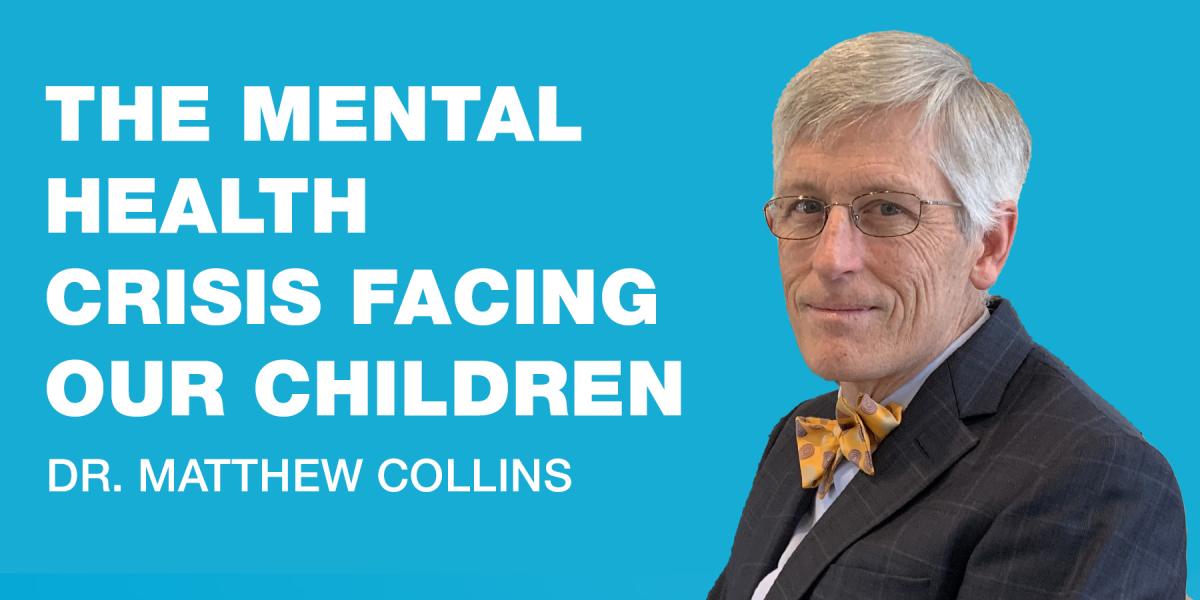
19 de mayo de 2022
The Mental Health Crisis Facing our Children
Matthew J. Collins, M.D., M.B.A., BCBSRI executive vice president and chief medical officer
May is Mental Health Awareness Month. Factors related to the pandemic over the last two years have had a tremendous impact on children’s mental health – from losing loved ones and caregivers to the fear of the unknown to disruptions of what were previously dependable routines for school, sports, activities, and socializing with friends. All of this has pushed kids to social media more and created more isolation than ever. Add to this mix the stress and anxiety from the ongoing struggle for racial justice that was reawakened in 2020, and it’s been the perfect storm for a growing mental health crisis.
But we must realize that the events of the last two years have only served to exacerbate and magnify issues that were already there before. The rates of childhood mental health concerns and suicide steadily increased from 2010 to 2020, and by 2018, suicide was the second leading cause of death for those between the ages of 10-24.
The situation surrounding children’s mental health was already very troubling before the pandemic, but the reality is it’s an even worse picture today. The pandemic has pushed this situation into a full-blown emergency, with dramatic increases in ER visits for all child mental health crises, according to Henry Sachs, president of Bradley Hospital. Consider these statistics* from the past year:
- 46 percent of Americans will meet the criteria for a diagnosable mental health condition sometime in their life, and half of those people will develop conditions by the age of 14
- 4.1 percent of youth (aged 12-17) had a substance use disorder
- 15.1 percent of youth had major depression
- 60.3 percent of youth with depression did not receive any mental health treatment
- 8.1 percent of youth with private insurance did not have coverage for mental or emotional problems
*Mental Health America
Couple this worsening crisis with a behavioral healthcare system in our state that’s not adequately prepared to handle it – and one that makes it difficult to get the right care at the time and place it’s needed – and we have a serious situation on our hands. Right now, children and adolescents are presenting with more mental health symptoms, self-injuries, and suicide attempts, yet we have staffing shortages and a reduced ability to provide appropriate services. For many if not most of these situations, waiting in the ER for hours or waiting months to meet with a therapist is not the answer. We need more capacity and increased access to the right care.
So, what do we do next?
In mid-April, a group of local pediatricians, psychiatrists, and hospitals declared a state of emergency in child and adolescent mental health. The Rhode Island Chapter of the American Academy of Pediatrics, Rhode Island Council for Child and Adolescent Psychiatry, Hasbro Children’s Hospital, and Bradley Hospital came together to create this important plea on behalf of our state’s behavioral healthcare system, and most importantly, our children and adolescents.
In the declaration, the groups laid out the challenges we’re facing as well as the need for increased state funding to increase access to care; fully funded, comprehensive community-based systems of behavioral healthcare; accelerated strategies to address workforce challenges in children’s mental health; increased funding for school-based mental healthcare; accelerated adoption of effective models of integrated mental healthcare in primary care pediatrics; and addressing the ongoing acute care needs for children and adolescents by expanding access to short-stay stabilization units and community-based response teams.
If you haven’t familiarized yourself with the declaration yet, I strongly recommend it. There’s certainly a lot of work to do, but I’m encouraged that it’s on the table and we’re shining light on what is a critical problem. In the meantime, please pay attention to the children in your life. Let them know the importance of talking to a trusted adult. Parents should also reach out to their children’s school with any questions or concerns.
And don’t forget about Kids’ Link RI™, Lifespan’s behavioral health triage service and referral network for children and adolescents. This service is available 24/7 at 1-855-543-5465 and can help divert children in a behavioral health crisis from the ER. Thank you and take care.

